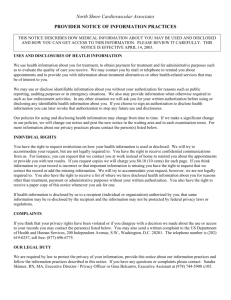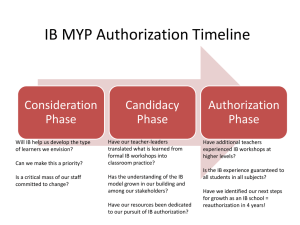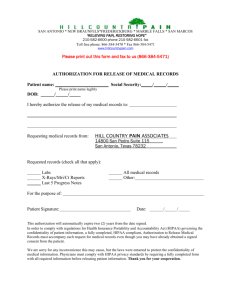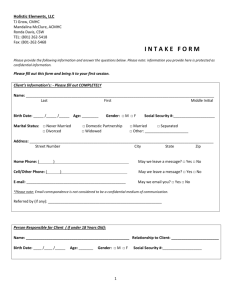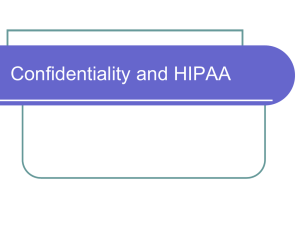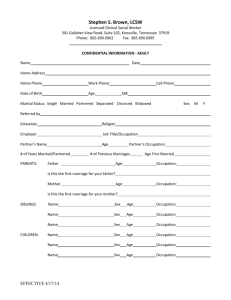File - Dr. Loren Bush
advertisement
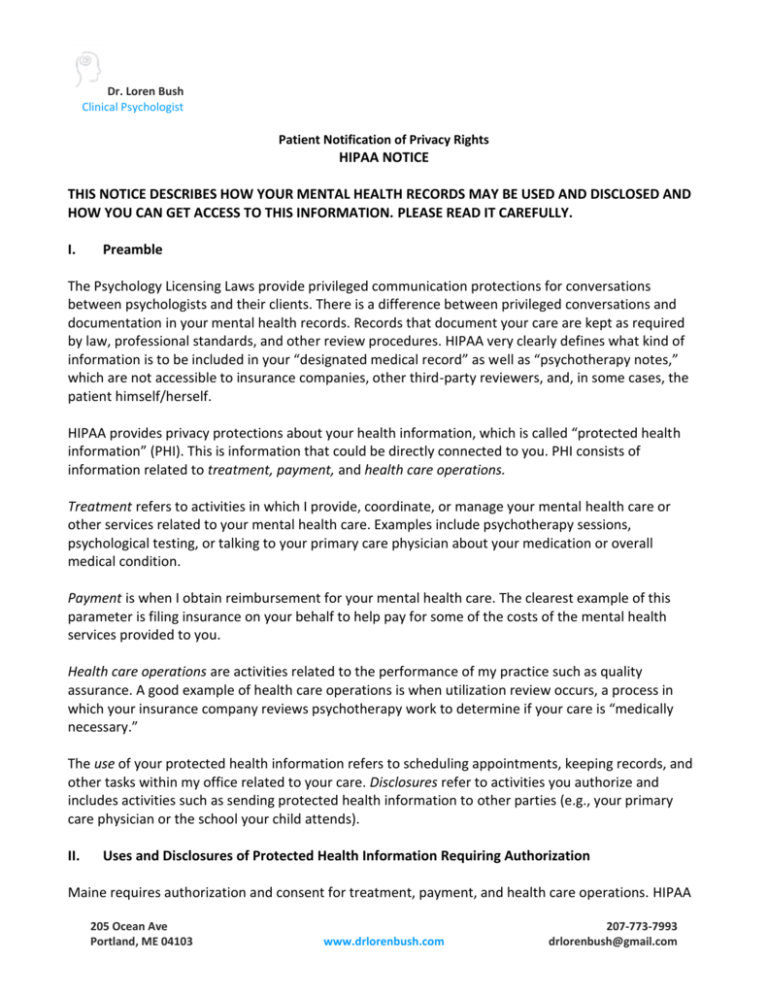
Dr. Loren Bush Clinical Psychologist Patient Notification of Privacy Rights HIPAA NOTICE THIS NOTICE DESCRIBES HOW YOUR MENTAL HEALTH RECORDS MAY BE USED AND DISCLOSED AND HOW YOU CAN GET ACCESS TO THIS INFORMATION. PLEASE READ IT CAREFULLY. I. Preamble The Psychology Licensing Laws provide privileged communication protections for conversations between psychologists and their clients. There is a difference between privileged conversations and documentation in your mental health records. Records that document your care are kept as required by law, professional standards, and other review procedures. HIPAA very clearly defines what kind of information is to be included in your “designated medical record” as well as “psychotherapy notes,” which are not accessible to insurance companies, other third-party reviewers, and, in some cases, the patient himself/herself. HIPAA provides privacy protections about your health information, which is called “protected health information” (PHI). This is information that could be directly connected to you. PHI consists of information related to treatment, payment, and health care operations. Treatment refers to activities in which I provide, coordinate, or manage your mental health care or other services related to your mental health care. Examples include psychotherapy sessions, psychological testing, or talking to your primary care physician about your medication or overall medical condition. Payment is when I obtain reimbursement for your mental health care. The clearest example of this parameter is filing insurance on your behalf to help pay for some of the costs of the mental health services provided to you. Health care operations are activities related to the performance of my practice such as quality assurance. A good example of health care operations is when utilization review occurs, a process in which your insurance company reviews psychotherapy work to determine if your care is “medically necessary.” The use of your protected health information refers to scheduling appointments, keeping records, and other tasks within my office related to your care. Disclosures refer to activities you authorize and includes activities such as sending protected health information to other parties (e.g., your primary care physician or the school your child attends). II. Uses and Disclosures of Protected Health Information Requiring Authorization Maine requires authorization and consent for treatment, payment, and health care operations. HIPAA 205 Ocean Ave Portland, ME 04103 www.drlorenbush.com 207-773-7993 drlorenbush@gmail.com does nothing to change this requirement. HIPAA does allow me to disclose PHI for the purpose of treatment, payment, and health care operations so long as I have your consent. You have signed this general consent to care and authorization to conduct payment and healthcare operations, authorizing me to provide treatment and to conduct administrative steps associated with your care (i.e. file insurance for you). Additionally, if you ever want me to send your protected health information to anyone outside my office, I will ask that you first sign a specific authorization to release information to a specified outside party. A copy of that authorization form is available to you upon your request. The requirement for you to sign an additional release form is an added protection to insure your protected health information is kept confidential. An example of this type of release of information might be if you request that I talk to your child’s school teacher about his/her ADHD condition and what this teacher might do to be of help to your child. Before I talk to that teacher, you will have first signed the proper authorization for me to do so. There is a third special authorization provision potentially relevant to the privacy of your records are my psychotherapy notes. HIPAA permits psychologists to keep separate “psychotherapy notes” from the overall “designated health record” in recognition of the importance of the confidentiality of conversations between psychologists and clients in treatment settings. “Psychotherapy notes” consist of notes “recorded in any medium by a mental health provider documenting and analyzing the contents of a conversation during a private, group or joint family counseling session and that are separated from the rest of the individual’s medical record.” They are necessarily more private and contain more personal information about you. You should know that “psychotherapy notes” cannot be secured by insurance companies and cannot be required by your insurance company in order for you to use your benefits. “Progress notes,” which are included in your designated mental health record, include the following: medication prescriptions and monitoring, assessment/treatment start and stop times, the modalities of care, frequency of the treatment provided, results of clinical tests, and any summary of your diagnosis, functional status, treatment plan, symptoms, prognosis, and progress to date. Certain payors of care, such as Medicare and Workers Compensation, require the release of both your progress notes and my psychotherapy notes in order to pay for your care. If I am forced to submit your psychotherapy notes in addition to your progress notes for reimbursement for services rendered, you will sign an additional authorization granting me permission to release my psychotherapy notes. Most of the time I will be able to limit reviews of your protected health information to only your “designated record set” which includes the following: all identifying paperwork you completed when you first started your care here, all billing information, a summary of our first appointment, your mental status examination, your individualized, comprehensive treatment plan, your discharge summary, progress notes, reviews of your treatment by managed care companies, results of psychological testing, and any authorization letters or summarizes of care you have authorized me to release on your behalf. Please note that the actual test questions or raw data of psychological tests which are protected by copyright laws and the need to protect patients from unintended, potentially harmful use are not part of your “designated mental health record. Dr. Loren Bush Clinical Psychologist You may revoke all authorizations to disclose protected health information at any time by submitting a written request. You cannot revoke an authorization for an activity that I have already completed as a result of an authorization your made or if the authorization was obtained as a condition for obtaining insurance. Maine law provides the insurer the ability to contest a claim under the policy. III. Business Associates Disclosures HIPAA requires that I train and monitor the conduct of those performing ancillary administrative services for my practice and refers to these people as “Business Associates.” In my practice, “business associates” include our secretaries who provide services such as typing, making phone calls, and filing insurance claims. These are all activities which bring them into some kind of contact with your protected health information. My clerical staff does not have access to those sections of your designated medical record that contains the particulars of your mental health concerns. Only I will have access to your full file. The only other “business associates” in my office are the cleaning crews. In compliance with HIPPA they have signed a formal contract which clearly spells out to them the importance of protecting your mental health information as an absolute condition of their employment. IV. Uses and Disclosures Not Requiring Consent or Authorization By law, protected health information may be released without your consent or authorization under the following conditions: • Child Abuse • Suspected Abuse of a Child • Adult and Domestic Abuse • Health Oversight Activities (licensing board activities) • Judicial or Administrative Proceedings (court order) • Serious threat to the health or safety of self or others • Workers Compensation Claims V. Patient’s Rights and My Duties You have the following rights: To request restrictions on certain uses and disclosures of your protected health information which I may or may not agree to. If I do agree to such restrictions, they shall apply unless our agreement is changed in writing. To receive confidential communications by alternate means and at alternative locations (e.g., sending bills to an address other than your home address). To inspect and copy your protected health information in your designated health record and any billing records for as long as protected health information is maintained in your record. 205 Ocean Ave Portland, ME 04103 www.drlorenbush.com 207-773-7993 drlorenbush@gmail.com To amend material in your designated health record, although I may deny an improper request and/or respond to any amendments you make to your record of care. To an accounting of unauthorized disclosures of your protected health information. To a paper copy of notices/information from me, even if you have previously requested electronic transmission of notices/information. To revoke authorization to release your protected health information except to the extent that action has already been taken on the authorization. For more information regarding each of the aforementioned rights, please do not hesitate to ask me for further assistance. I am required by law to maintain the privacy of your protected health information and to provide you with a notice of your Privacy Rights and my duties regarding your protected health information. I reserve the right to change my privacy policies and practices as needed with these current designated practices being applicable unless you receive a revision of my policies when you come in for your appointment(s). My duties as a psychologist on these matters include this notice unless it is changed and you are so notified. Please notify me if you desire a copy of my internal policies for executing privacy practices. VI. Complaints I am the appointed “Privacy Officer” for my practice per HIPAA regulations. Please notify me if you have any concerns about your privacy rights being compromised. You may also send a written complaint to the Secretary of the U.S. Department of Health and Human Services. VII. EffectiveDate This notice shall go into effect July 12, 2015 and remain so unless new notice provisions effective for all protected health information are enacted accordingly.
